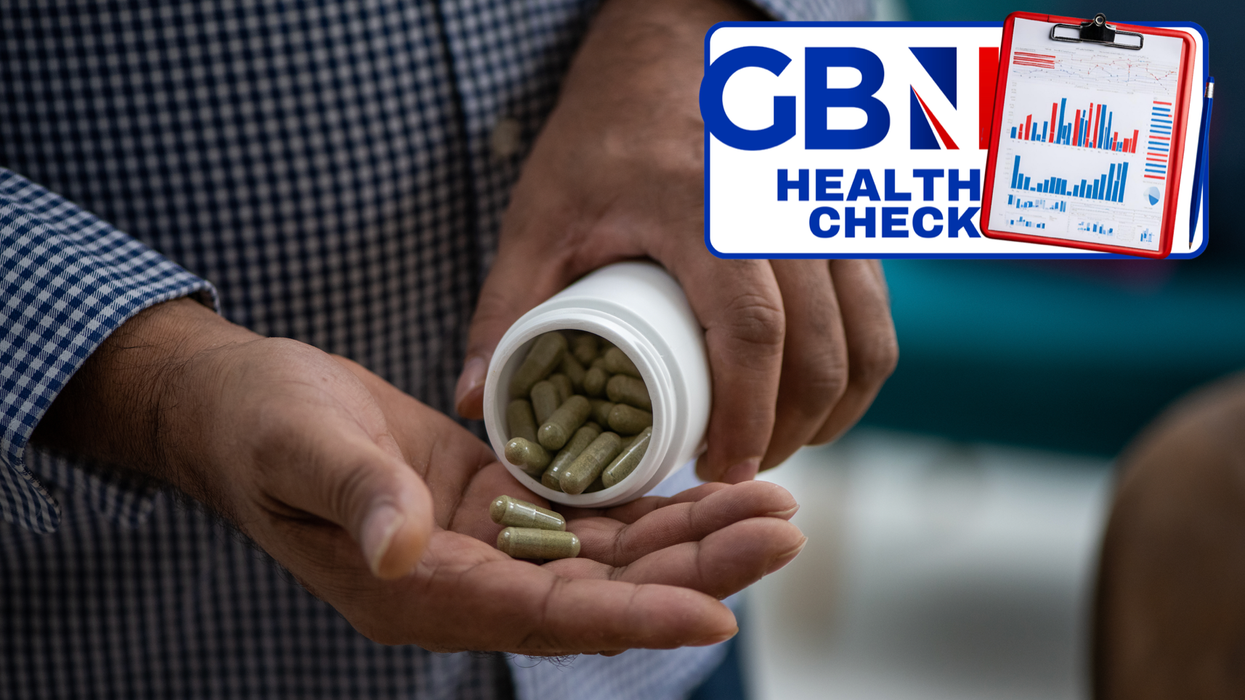GBN Health Check: The five best supplements for lowering high blood sugar levels - and what to avoid

Supplements have been shown to reduce high blood sugar levels in numerous studies
|Getty Images

In this week's GB News Health Check, our Health Editor speaks to the experts about the best supplements for lowering high blood sugar levels.
Don't Miss
Most Read
Latest
All products and promotions are independently selected by our experts. To help us provide free impartial advice, we will earn an affiliate commission if you buy something. Click here to learn more
We all need sugar in our blood to provide cells with energy.
The body's primary source of energy comes from the food we eat. Your body breaks down most of that food into glucose (blood sugar) and releases it into your bloodstream.
When your blood glucose goes up, it signals your pancreas to release the hormone insulin to regulate it.
If you have diabetes, you don't produce enough insulin. This means sugar stays in the bloodstream.
Over time, high blood sugar levels can damage your blood vessels and cause a host of other complications, such as coronary heart disease and kidney disease.
To compensate for poor insulin production, people with diabetes must turn to their diet to keep high blood sugar levels at bay. No single dietary component will reduce high blood sugar levels but supplements can be added to your protective arsenal, research suggests.
- View Deal | Save on one-month supply of Berberine tablets at Amazon
- View Deal | Buy one, get one 50% off on Cinnamon tablets at Holland & Barrett
- View Deal | Get Chromium Picolinate 200µg from Amazon
- View Deal | Subscribe to multivitamin gummies from MyVitamins
Here are five promising candidates...
Berberine
Berberine hydrochloride, commonly known as berberine, is a compound found in several plants. It has been widely used to treat type 2 diabetes due to its ability to regulate blood sugar and lipid levels.
In a review of 27 studies conducted on the effects of Berberine on blood sugar levels, the researchers found that, alongside improvements in lifestyle, supplementing with berberine reduced fasting blood sugar levels without any serious side effects.
The finding is significant because fasting blood sugar levels, sometimes called your morning blood sugar, is the amount of glucose (sugar) in your blood after not eating for eight to 10 hours.
It offers a more accurate picture of how well you are managing your blood sugar in the absence of food.
According to an older review of 14 studies, berberine may be as effective as certain oral diabetes drugs, including metformin, glipizide, and rosiglitazone.
In a separate study of 116 people with diabetes, published in the journal Endocrine Society, taking one gram of berberine per day lowered fasting blood sugar by 20 percent.
How does it work?
Speaking to GB News, Carolina Goncalves, Superintendent Pharmacist at Pharmica reports, cites research showing that berberine lowers blood sugar by activating an enzyme called AMP-activated protein kinase (AMPK).
This enzyme enhances insulin sensitivity by promoting the movement of glucose transporter 4 (GLUT4) to the cell membrane, which increases glucose uptake into muscle and fat cells.
Additionally, berberine boosts a system similar to the insulin-like growth factor-1 (IGF-1), which increases insulin production, explains Ms Goncalves.
This extra insulin helps your body become less resistant to it, meaning cells respond better to insulin.
As a result, liver, muscles, and fat tissues can use the sugar in the blood more effectively, keeping blood sugar levels lower.
As a bonus, berberine is a "low-cost supplement" so it is an economical way of managing diabetes for many patients on the breadline, notes Carl Smith, personal trainer and CEO for Active Careers.
It is worth acknowledging that berberine may cause digestive disturbances, such as constipation, diarrhoea, or gas.
The compound may interact with several medications, so check with your doctor before taking this supplement.
Vitamin D
Vitamin D is obtained from sunlight and found in foods such as egg yolks, oily fish, and red meat.
It can also be taken in supplement form.
The "sunshine vitamin" helps keep bones healthy but it can reduce blood sugar levels.
In one study, published in the Journal of the American College of Nutrition, 72 percent of participants with type 2 diabetes were deficient in vitamin D at the start of the study.
After two months of taking a supplement of vitamin D daily, both fasting blood sugar and A1C (average blood sugar over the past three months) improved.
How does it work?
Ms Goncalves cites studies showing that vitamin D may help facilitate insulin function by producing more insulin receptors, which increases insulin sensitivity.
This increased insulin sensitivity allows cells to absorb more glucose from the blood, thereby reducing blood sugar levels.
Moreover, vitamin D stimulates the pancreas to release more insulin, the pharmacist notes.
This increased insulin helps move glucose from the blood into cells more effectively, resulting in lower blood sugar levels.
Just remember taking too much can be harmful: it can cause too much calcium to build up in the body. This can weaken the bones and damage the kidneys and the heart.
If you choose to take vitamin D supplements, 10 micrograms a day will be enough for most people, says the Department of Health and Social Care.
Alpha lipoic acid (ALA)
Alpha Lipoic Acid (ALA) is a naturally occurring compound present in every cell of the body, playing a vital role in energy production by aiding enzymes that convert nutrients into energy.
It is particularly beneficial for individuals with type 2 diabetes due to its potential to reduce blood sugar levels.
In one study, 57 type 2 diabetes patients were divided into two groups to receive either ALA (300 mg daily) or placebo, and were followed-up for eight weeks.
After an overnight fasting and two hours after breakfast, patients’ blood samples were drawn and tested for fasting blood sugar levels and postprandial blood sugar - the level of sugar in your blood after you eat and drink — is an important indicator of metabolic and overall health
The result of the study showed a "significant" decrease in fasting and postprandial blood sugar levels compared with placebo.
How does it work?
Ms Gonconcalves explained: "As a coenzyme, ALA is crucial for glucose oxidation."
The oxidation of glucose refers to the breakdown of glucose into usable products
According to the pharmacist, by enhancing "glucose utilisation efficiency", ALA helps lower blood glucose levels, which is significant for those with impaired glucose metabolism (typically those with diabetes).
Research also shows that ALA also modulates insulin signalling pathways.
This improves insulin sensitivity, allowing cells to uptake glucose more efficiently, and reduce overall blood glucose levels.
Furthermore, ALA's antioxidant properties combat oxidative stress - a contributor to insulin resistance and beta-cell dysfunction in diabetes, reports Ms Goncalves.
By "scavenging reactive oxygen species (ROS) and reducing oxidative stress, ALA protects pancreatic beta-cells and supports adequate insulin secretion and blood sugar regulation", she adds.
Doses of ALA range from 200 to 2400 mg/day for adults. There is no evidence for a specific dose.
Cinnamon
As Mr Smith, the PT, explains, your blood sugar levels can "rocket" depending on the size of the meal and what you have eaten.
Consuming cinnamon is considered a good way of controlling those spikes in blood sugar levels, he says.
Research suggests he is onto something.
In a study of 60 middle-aged adults published in the journal Diabetes Care, cinnamon improved blood glucose and "bad" LDL cholesterol levels in people with type 2 diabetes.
The cinnamon was consumed for 40 days. This was followed by a 20-day “wash out” phase where no pills were taken.
The researchers found that cinnamon cut cholesterol by about 18 percent and blood sugar levels by 24 percent.
How does it work?
Ms Goncalves said: "Cinnamon contains cinnamaldehyde, an organic compound that is currently being studied for its potential to enhance insulin sensitivity and help manage blood sugar levels in some individuals.
"Although cinnamaldehyde may improve the responsiveness of insulin receptors on cell surfaces, thereby aiding in glucose uptake, the exact mechanisms have yet to be confirmed."
Indeed, research suggests that cinnamaldehyde could mimic the effects of insulin and facilitate glucose absorption.
However, there is no evidence to support a direct link between cinnamaldehyde and an improvent in insulin release.
It is also worth noting that eating too much cinnamon may cause health problems because it contains high amounts of a compound called coumarin.
Research has found that eating too much coumarin - a chemical compound found in cinnamon - may harm your liver.
Research suggests the limit should be about 0.1 milligrams (mg) per one kilogram (kg) or 2.2 pounds (lb) of body weight.
LATEST DEVELOPMENTS
Chromium
Chromium is an essential trace mineral found in foods and supplements.
For many years, researchers have studied the effects of chromium supplements for type 2 diabetes.
A review of 41 studies published in American Diabetes Association concluded chromium supplementation "significantly" improves glycaemia (presence of blood sugar in the blood) among patients with diabetes.
A separate study conducted in 1997 found participants given 1,000 mcg/day of chromium had significantly lower fasting serum glucose in their bloodstream than those reviving 200 mcg/day and those within their placebo group.
Additionally, the group that received 200 mcg/day showed significantly lower blood glucose levels when compared to the placebo group, and found a direct correlation between the intake of chromium and the lowering of blood sugar levels.
How does it work?
Ms Goncalves cites research that suggests chromium may potentially form compounds in the body that can enhance the ability of insulin to improve glucose uptake by cells, a process known as insulin efficiency.
This results in increased insulin sensitivity, reducing how much insulin the body needs to transport glucose to cells, subsequently helping control blood sugar and reducing the risk of type 2 diabetes.
It is worth acknowledging that research is limited and a handful of experts have raised concerns about supplementing with the trace mineral.
Chromium could influence neurotransmitters, they say, claiming that the supplement could harm individuals who suffer from depression, bipolar disorder or schizophrenia.
Furthermore, chromium can cause severe skin reactions.
Broccoli, potato skins, and unrefined whole grains such as quinoa and oats are good dietary sources of chromium and can contribute to the intake of this important trace mineral to help control blood sugar levels, notes Ms Goncalves.
With that said, it is vital to remember that these foods are dietary supplements that should be used as part of a broader plan to control blood sugar levels and manage metabolic conditions such as diabetes, she says.
The pharmacist advises using diabetes devices periodically to determine whether increasing the intake of foods containing chromium is making a meaningful difference to controlling blood sugar levels.
Having 10mg or less a day of chromium from food and supplements is unlikely to cause any harm, according to the Department of Health and Social Care.
General tips for lowering blood sugar
No one type of food can quickly lower the amount of sugar in your blood.
Instead, a range of factors can influence your blood sugar response.
Some factors include your meal’s nutrient content, the time of day, and your food combinations.
As a general rule, foods that rank high on the Glycaemic Index (GI) are more likely to cause a spike in blood sugar.
The GI ranks carbohydrate foods, depending on how quickly they are digested and absorbed into your bloodstream as glucose.
Carbohydrates which are quickly digested and absorbed into the bloodstream have a high GI. This causes a rapid rise in blood glucose levels.
Carbohydrates which are digested and absorbed slowly have a low GI.
This causes a more controlled and steady rise in blood glucose levels.
Lower GI foods, including wholegrains, fruit, beans, lentils, and vegetables, are generally low in calories too.
Higher GI foods include:
- White bread
- Corn flakes
- Fruit juice
- Instant noodles
- Rice cakes
- Potatoes
There is also evidence that eating a low-calorie diet (800 to 1,200 calories a day) on a short-term basis (around 12 weeks) can lead to significant weight loss and reduce blood sugar levels in people with type 2 diabetes.
Why does weight loss help?
As the NHS explains, losing weight (if you're overweight) will make it easier for your body to lower your blood sugar level, and can improve your blood pressure and cholesterol, reducing your risk of further health problems.










